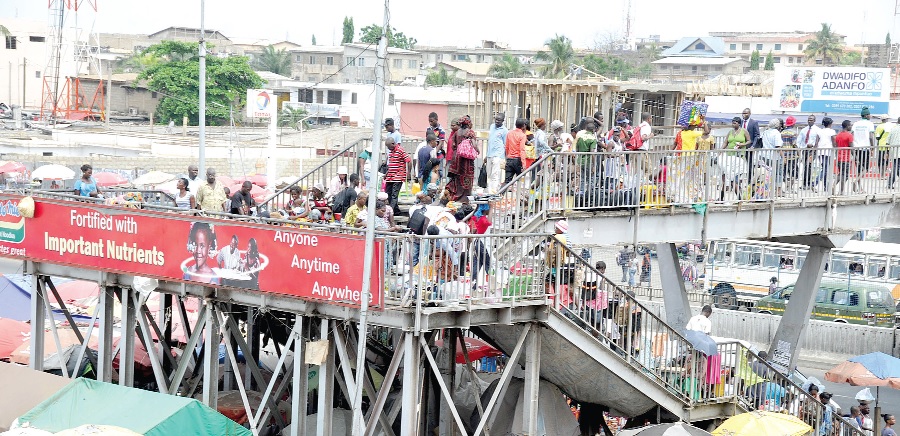Danger looms at Kaneshie overhead bridge
 There is a looming danger at the main Kaneshie overhead bridge following its takeover by traders who have virtually turned the place into a market.
There is a looming danger at the main Kaneshie overhead bridge following its takeover by traders who have virtually turned the place into a market.
Advertisement
The traders, who display various wares, have taken over both sides of the bridge leaving only a small path in the middle for pedestrians to use.
Activities of the traders, which take place almost every evening and at weekends, are not only threatening the lifespan of the bridge but also putting lives of users of the facility at risk. Although there are occasional repair works on the bridge, there is the fear that if the weight on the facility is not controlled, it would collapse one day.
The smaller of the two bridges has not been spared the activities of traders either and even though the bigger bridge has a large trader presence, the problem is that both are being used as sales points.
Goods such as used clothing, clocks, confectionaries, cooking ware, glasses, schoolbags, disinfectants, assorted fruits and soft drinks, sachet water, and many others are sold daily on the footbridges.
These items are displayed from the stairs to the deck of the bridges, thereby impeding the free movement of people.
As if trading on the bridges is not enough, the activities of beggars have compounded the situation. Beggars could be seen soliciting for alms as people move to and fro. Some of the beggars, especially the females with children, endanger the lives of their children by taking them to the top of the bridges to beg for alms.
Some preachers also mount loud speakers on the big footbridge to deliver their sermons to commuters.
Brisk business activities on the bridge often create human congestion.
Although their presence on the bridge is illegal, a commuter who inadvertently steps on the wares of a trader could either be attacked or verbally assaulted.
Sometimes members of the taskforce of the Accra Metropolitan Assembly (AMA) are placed on guard on the bridge to drive traders away but the traders return as soon as the guards leave.
Traders
Amerley Tagoe, a clock dealer, said she constantly displayed her wares on the bridge and that “anytime you want to buy you come here and I would serve you”.
She told this reporter that although it was not right to do business at the place one could not resist doing that because of the large movement of people on the bridge.
“We are not supposed to be here but because people pass here every now and then, we had to chase them here,” she said.
Another trader, Adwoa Menya, indicated that some of the traders did not have allocated places for selling in the Kaneshie Market, and found the top of the bridge a place to make money to fend for themselves and their families.
“We all cannot go into the market; after all there are no spaces. So some of us have taken the risk to come here,” she said.
Asked if they were not afraid, she said, “We are now used to this place, and we only look around for the AMA people.”
She responded in the negative in response to a question whether anyone had raised a false alarm that the bridge was collapsing.
For George Addo, who deals in used clothes, man must survive, and condemned the attitude of his colleagues who tended to attack people who mistakenly stepped on their products.
“I don’t think this is right. We are not supposed to be here in the first place,” he said.
Sacking traders from the bridge, he said, was the right thing to do but contended that it would indirectly affect their livelihood.
Commuters
A senior high school master, Moses Tetteh, described the activities of the traders as a nuisance.
He, therefore, called for a permanent presence of the taskforce so that people could move freely.
Ama Sekyiwaa, a commuter, said if nothing was done about the people selling on the bridge there could be a disaster.
“I believe the weight on the bridge is too much and this could affect its lifespan,” she said, and called on those in charge to act with dispatch.
A mechanic, Atta Mensah, said “we are always complaining that we don’t have money”.
“Instead of us managing the few things we have we want to destroy them,” he retorted.
Kofi Annan, an artist, suggested the establishment of a proper night market for the traders.
Doing business on the bridge, he said, was absolutely wrong “but we should get a better place to accommodate them”.
Roads and Highways
The Director of Bridges at the Ghana Highway Authority, Mr Owusu-Sekyere Antwi, told the Daily Graphic that indeed the presence of people selling on the bridge could affect its lifespan.
According to him, it was the duty of the city authorities to make sure that nobody sold on the bridge.
Mr Antwi said the activities of the hawkers and traders “are beyond us and there is nothing we can do”.
Occasionally, he said, he went to the bridge to do inspections, and indicated that last Sunday workers from the GHA were at the bridge to fill concrete slabs that were broken.
Asked how safe the bridge was, he said an assessment had been done and it was when the final report was ready that he would be able to tell the state of the bridge.
By Emmanuel Bonney/Ghana



